Feeding Pet Birds: Key Nutritional Insights for Owners
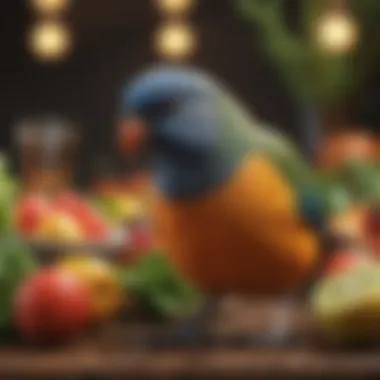
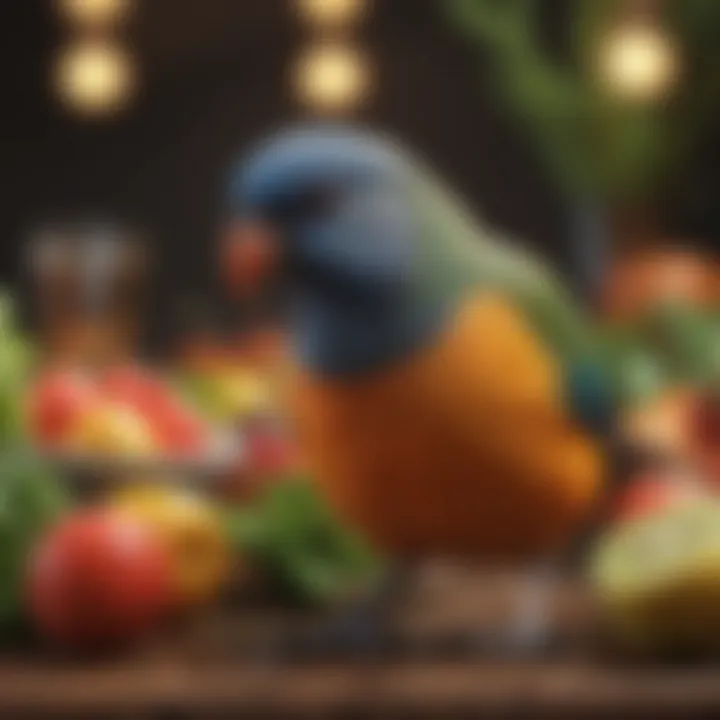
Intro
Feeding pet birds requires more than just tossing seeds into a cage and calling it a day. While many might think all birds eat the same way, there's a world of diversity when it comes to their dietary needs. Just as each bird species has unique characteristics and behaviors, so too do their nutritional requirements differ significantly. Understanding these nuances is essential for any devoted bird owner.
Getting the nutrition right is a cornerstone of keeping your feathered friend happy and healthy. Poor nutrition can lead to various health issues, including obesity, weakened immune systems, and even a shortened lifespan. This article aims to guide you through the basic principles of avian nutrition, illuminating the key aspects of a balanced diet, and debunking common myths. From the significance of fresh fruits and vegetables to the types of seeds and supplements that contribute to optimal health, let's explore how to effectively nurture your avian companion.
Understanding Avian Nutrition
Understanding avian nutrition is key to ensuring the health and happiness of pet birds. Many people underestimate the dietary needs of these birds, thinking a simple diet will suffice. However, just like humans, birds need a balanced mix of nutrients for optimal health. A deep dive into avian nutrition reveals the distinct dietary requirements of diverse bird species and the specific components necessary to sustain them. It's not just about filling the food dish; it's about choices that promote longevity and vitality.
The Importance of a Balanced Diet
A balanced diet is not merely a nicety; it is a necessity for pet birds. Many species can suffer from health issues if their diet is lacking. An unbalanced diet can lead to deficiencies, obesity, or disorders like feather plucking or organ failure. When birds receive a mix of seeds, fruits, vegetables, and the occasional protein, they thrive, showing vibrant feathers and lively behaviors.
Nutritional Requirements of Different Species
Birds are not a monolithic group; they come in all shapes and sizes, each with their own dietary needs. Let's break down the nutritional considerations for small birds, medium birds, and larger parrots and how these aspects interplay in their overall health.
Small Birds
Small birds, like finches and budgerigars, have distinct dietary requirements. These feathered friends typically have faster metabolisms than larger birds, necessitating a higher intake of food relative to their size. A varied diet that includes seeds, vegetables, and fruits ensures they get enough essential nutrients.
A key characteristic of small birds is their energetic nature. They can be a joy to watch as they flit about their cages. However, their tiny stomachs can be a challenge—too much seed can lead to obesity. Thus, a balanced diet with portion control is crucial for maintaining their health.
Medium Birds
Medium birds encompass a range of species, such as cockatiels and conures. They tend to be a popular choice among bird keepers because of their playful temperaments and ability to form strong bonds with their human companions.
These birds require a mix of seeds, pellets, veggies, and fruits to fuel their more moderate metabolism. A unique feature of medium birds is their social behavior, leading them to mimic sounds and interact with their surroundings. The right nutrition supports not just their physical wellbeing but also their vocal and social development.
Larger Parrots
Larger parrots, like macaws and African grey parrots, have specific dietary needs shaped by their size and unique digestive systems. They require a more substantial intake of nutrients, including high-quality pellets, fresh produce, and proteins like nuts or beans. Larger parrots are known for their longevity, but poor nutrition can shorten their lifespan. Their intelligence and personality make them a sought-after species, but along with this, comes the responsibility of providing a varied and nourishing diet to keep them healthy and happy.
Basic Nutritional Components
Every bird owner must understand the basic nutritional components essential for avian health. Here’s a closer look at proteins, carbohydrates, fats, vitamins, and minerals:
Proteins
Proteins play a fundamental role in bird diets, contributing to growth, feather development, and overall health. They’re vital for cellular repair and regeneration, and without adequate protein, birds may experience weakened immune systems or poor feather quality.
Birds obtain proteins from various sources such as legumes, seeds, and even lean meats for those that are not strict vegetarians. Thus, ensuring they have access to protein-rich foods can significantly enhance their health and vitality.
Carbohydrates
Carbohydrates are another critical component, serving as a primary energy source. Birds need energy for everything—from flapping their wings to singing their hearts out. Rich sources of carbs include fruits, grains, and many vegetables.
However, not all carbs are created equal. A diet too high in simple carbohydrates can lead to obesity and related health issues. On the flip side, complex carbohydrates, found in whole grains and fresh produce, provide sustained energy and nutrients necessary for a healthy bird.
Fats
Fats are essential in small amounts, providing concentrated energy and aiding in the absorption of fat-soluble vitamins. Seeds, nuts, and avocados (used sparingly due to being calorie-rich) contain healthy fats that can support a bird's skin and feather condition.
Yet, overindulgence in fatty foods can lead to obesity, which is a common issue in many pet birds. Therefore, it's important to strike the right balance when incorporating fats into their diet.
Vitamins and Minerals
Lastly, vitamins and minerals act as the unsung heroes of a bird’s nutritional needs, supporting a myriad of bodily functions. For instance, calcium is vital for bone health and reproduction in birds, while vitamins A, D, and E are necessary for immune function and overall wellbeing.
A diet rich in colored vegetables and specific fruits can often meet these mineral and vitamin needs, but sometimes, supplementation might be necessary to fill gaps. By keeping a close eye on their diet and providing a broad spectrum of foods, bird owners can ensure their pets remain in top health.
Common Dietary Misconceptions
Understanding the myths that surround avian nutrition is crucial for pet bird owners. It helps dispel harmful practices and encourages healthier dietary choices for these charming companions. There seems to be a persistent tendency among bird owners to cling to pretenses about what constitutes a proper diet for their pets. Oftentimes, these misconceptions stem from anecdotal evidence or old-school thinking, rather than scientific grounding. In this section, we’ll break down three key areas where misunderstandings commonly arise: seed-only diets, the nature of pelleted diets, and the role of treats.
Seed-Only Diets
Many bird owners view seeds as the only food their pets need, claiming it’s the natural choice, given that many wild birds consume seeds. While seeds certainly can be a part of a bird's diet, relying solely on them can lead to nutritional deficiencies. Seeds often lack essential vitamins, minerals, and amino acids that are vital for a bird's overall health. The high-fat content found in many seeds can also contribute to obesity and related health issues.
For instance, imagine a parakeet chowing down on a diet strictly composed of sunflower seeds. This diet might seem satisfying on the surface, but in the long run, it could lead to disorders such as fatty liver disease or reproductive issues. Instead, there’s a pressing need to incorporate a variety of foods, such as vegetables and fruits, into your bird's meals. A dish that features chop—finely chopped veggies mixed with grains—can be a much more nourishing option.
Understanding Pelleted Diets
Pelleted diets are becoming increasingly popular among avian enthusiasts. Unfortunately, there are still many misconceptions regarding their formulation and benefits. Some bird owners falsely believe that these commercial diets are a one-size-fits-all solution for all birds. However, not all pellets are equal, and some may contain fillers or preservatives that aren’t healthy. Therefore, it’s essential to do your research and select high-quality pellets that use wholesome ingredients.
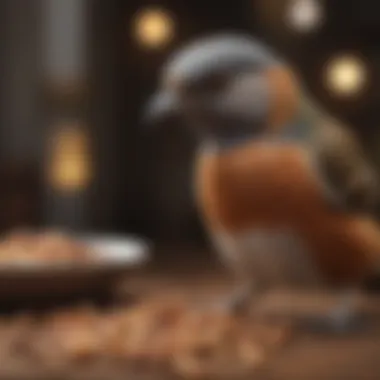
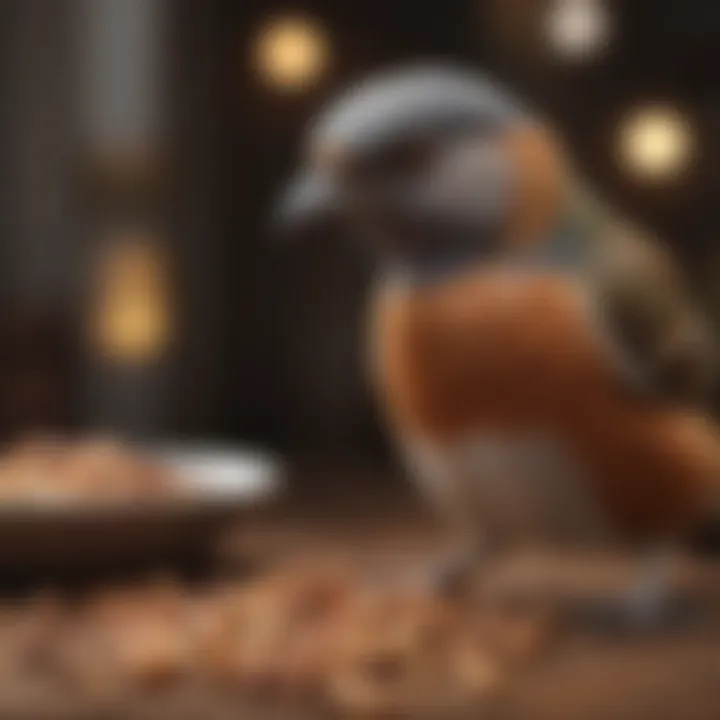
Additionally, pelleted diets should not be the sole food source. They must be part of a balanced diet. Consider this: If your pet bird is exclusively fed pellets, it may miss out on the variety of textures and flavors found in fresh fruits and vegetables. Mixing pellets with other food sources can enhance the diet and keep your bird interested in meal times.
The Role of Treats
Treats are an often-misunderstood component of a bird’s diet. While they do provide enjoyment, many owners are unsure how to incorporate them without tipping the scales toward unhealthiness. Treats should be just that—delicious extras that provide enrichment rather than staples in a bird’s diet.
A small piece of fruit or a few nuts can be a delightful treat for your feathered friend, but moderation is key. As a rule of thumb, try to keep treats to less than 10% of the overall diet. Beyond that, you run the risk of creating a picky eater or worse, introducing problematic health issues. Instead, focus more on providing healthful, species-specific snacks that enhance the positive aspects of their diet.
It's pivotal to remember that a little education goes a long way in ensuring a well-rounded diet for your pet bird.
In summary, demystifying these common dietary misconceptions enables pet bird owners to make informed choices that promote optimal health for their avian friends.
Selecting the Right Foods
Choosing the right food for pet birds is not just a matter of filling their bowls—it's a fundamental aspect of ensuring their health and longevity. Birds, much like humans, thrive on a diverse diet that meets their specific nutritional needs. An informed choice can prevent various health issues and promote a better quality of life for your feathered companions. This section breaks down how to evaluate options, the role of fresh produce, and the need to be mindful of food allergies and sensitivities.
Evaluating Commercial Bird Foods
When looking at commercial bird foods, one can easily get overwhelmed by the sheer number of options out there. It's important to scrutinize the labels carefully. Ideally, a good bird food should provide a well-rounded nutritional profile. Look for ingredients such as real fruits, vegetables, and whole grains rather than merely seeds or fillers.
Consider the following:
- Protein Content: Ensure that the feed contains an adequate amount of protein which is crucial for muscle growth and overall health.
- No Artificial Additives: Many brands may include synthetic colors or preservatives. Opt for brands that boast all-natural ingredients.
- Manufacturer Reputation: Do your research on the brands, looking up reviews and checking if they commit to rigorous quality standards.
It's a wise move to consult your avian veterinarian to find a suitable commercial brand tailored to your bird’s specific needs.
Incorporating Fresh Produce
Safe Vegetables and Fruits
Fresh produce plays a crucial role in a bird's diet. It provides vitamins and aids in hydration. However, not all fruits and vegetables are safe for birds, so knowledge is key. Some safe options include:
- Leafy Greens: Kale, spinach, and dandelion greens are nutritionally dense.
- Fruits: Apples (without seeds), bananas, and berries are popular choices.
The unique feature of safe vegetables and fruits lies in their high antioxidant content. These antioxidants help in preventing many diseases, making them a beneficial choice. Incorporating these can also encourage your pet to adopt a more varied diet.
Preparation Tips
Once you've selected safe vegetables and fruits, how you prepare them counts too. Basic washing is often not enough; here are some tips that could add value to your bird's meals:
- Chop into Small Pieces: Smaller pieces are easier for birds to eat, reducing waste and frustration.
- Presentation: Try hanging fresh produce in their cages. It mimics foraging behavior, making it more enjoyable for your pets.
- Avoid Seasoning: Birds should never have additives like salt or sugar. Keeping it simple is best.
Preparation tips include not only cooking or chopping but also the way fresh food is presented. Using a variety of methods keeps your bird curious and willing to try new foods.
Consideration of Allergies and Sensitivities
Just like humans, birds can be sensitive or allergic to certain foods. This underscores the importance of offering a diverse diet and observing your bird's reactions. Consider potential allergens such as:
- Certain Fruits: Some birds may have issues with citrus fruits.
- Grains: Wheat and corn may cause problems in some cases.
Monitoring your bird after introducing new food is essential. If you notice signs of distress or changes in behavior after eating certain foods, consult with a vet to re-evaluate their diet. Having an understanding of possible allergies can prevent unnecessary health complications and foster a nurturing environment for your pet bird.
Understanding Feeding Behavior
Understanding the feeding behavior of pet birds is crucial for ensuring they receive a balanced diet tailored to their specific needs. Birds, much like humans, have preferences and instinctual tendencies regarding what and how they eat. Recognizing these patterns not only enhances their nutritional intake but also promotes their overall well-being. This section dives deep into two essential elements of feeding behavior: instinctual eating patterns and social feeding dynamics. Each plays a significant role in how birds choose their food, how these choices can affect their health, and how owners can ensure their feathery companions thrive.
Instinctual Eating Patterns
Birds' instinctual eating patterns are woven into their genetic makeup and represent how they interact with food in their environments. These behaviors have evolved, shaped by the birds' natural habitats, foraging habits, and life experiences. For instance, small birds like canaries and finches often rely on a mix of seeds and fruits, reflecting their foraging habits in the wild. This affinity for seeds is not just preference; it is also a survival mechanism. By understanding these natural instincts, owners can offer food options that mirror their birds' instinctual behaviors.
When it comes to feeding pet birds, here are some key factors to consider:
- Variety is Key: Just like humans enjoy a range of foods, birds thrive on variety. Mixing seeds, pellets, and fresh produce helps mimic their natural quest for nutrient-rich foods in the wild.
- Foraging Opportunities: Birds are natural foragers. Providing them with opportunities to explore and search for their food can enhance their mental stimulation. For example, hiding small treats within their cage can spark their curiosity and engage their instinctual behavior.
- Observation is Essential: Pay attention to your bird's individual preferences and aversions. Some birds may prefer softer foods, while others might enjoy crunchier textures. Adjusting their diet based on what you observe can make a noteworthy difference in their health and happiness.
Remember: Each bird is unique, and understanding these instinctual behaviors is a critical component in enhancing their nourishment and quality of life.
Social Feeding Dynamics
Feeding is not only about nutrition; it’s also a social activity for many birds. In the natural world, birds often feed in groups, and this social interaction influences their eating habits. For pet birds, replicating this dynamic provides not only companionship but also enriches their feeding experience.
Consider these social feeding dynamics:
- Peer Influence: Birds often model their eating behavior after their peers. If one bird engages with a certain type of food, others may be inclined to mimic that behavior. This presents an opportunity for pet owners to introduce new foods to the flock by allowing more adventurous eaters to showcase these options to their more cautious companions.
- Shared Meals: As with many species, sharing food can strengthen social bonds. In an environment where multiple birds coexist, offering communal feeding stations can encourage social interaction and reduce competition. Using shallow dishes filled with fresh vegetables, fruits, and grains can facilitate this shared experience, allowing birds to enjoy food alongside one another.
- Learning Through Observation: Birds are clever creatures, capable of learning by watching each other. This means if one bird discovers a new food, the others are likely to follow suit after observing that it is safe and palatable. Engaging birds in social feeding not only promotes better food choices but also enhances their cognitive skills.
By integrating an understanding of both instinctual eating patterns and social dynamics into their feeding practices, pet bird owners can create an enriched feeding environment that not only meets their birds' nutritional needs but also nurtures their natural behaviors. Emphasizing these practices can pave the way for healthier, happier, and more fulfilled feathered companions.
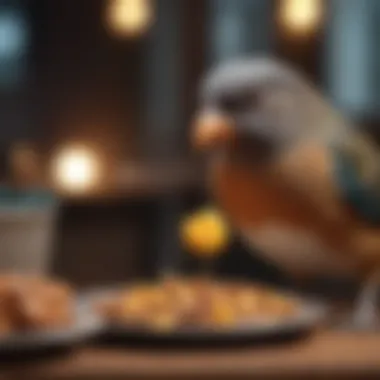
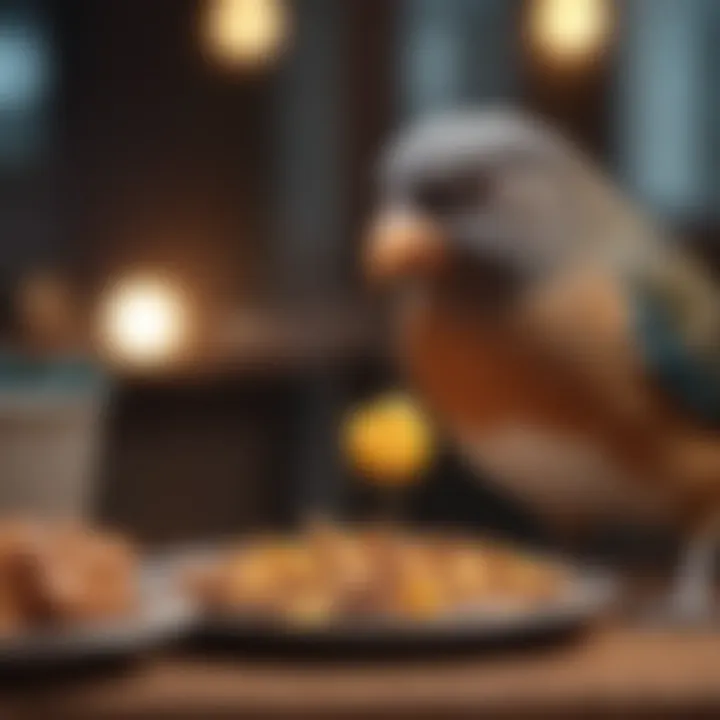
Supplementing the Diet
Supplementing the diet of pet birds can be a crucial aspect of ensuring that they receive essential nutrients that may not be fully met through their regular feed. Understanding how and when to supplement is key. Many owners can misjudge the dietary needs of their avian companions; hence, it’s essential to tread carefully. Birds, just like any living creature, require a mixture of nutrients for overall health. But, before rushing to add supplements to their meals, one needs to consider their unique requirements based on species, age, and health status.
When and How to Supplement
Knowing when and how to supplement requires an attentive eye. Generally, if you notice changes in behavior or droppings, it might be time to consider supplementation. It’s best to start by finding what their regular diet consists of and then evaluate if there's a gap in nutrients. Typically, a thorough analysis of feed should come first.
- Signs that your bird may need supplementation can include:
- Excessive feather plucking
- Decreased energy levels
- Soft or fragile beak
One effective approach is to introduce supplements gradually. Sudden changes can upset the bird’s stomach or cause them to reject the food altogether. Watch closely as they adapt. If they seem to eat the new supplement without issues, it could be a properly chosen supplement.
Popular Supplements for Pet Birds
There’s a variety of supplements available, each serving distinct purposes in enhancing avian health. Here are a few of the most recommended ones:
Calcium
Calcium plays a vital role for pet birds, particularly for breeding females who need it for egg formation. The absence of calcium can lead to serious health issues, such as egg-binding, which can be deadly.
Key characteristic: Calcium's ability to strengthen bones and maintain nerve health makes it indispensable.
Why it’s popular: Many bird owners opt for it to prevent deficiencies since they’re aware of the potential complications arising from a lack of calcium.
Unique features: Calcium can be found in various forms, such as powdered supplements or cuttlebones. This variety gives owners options based on their birds’ preferences and needs.
Advantages: Adding calcium to the diet is straightforward and can significantly reduce the risk of associated health risks.
Disadvantages: However, over-supplementation can lead to hypercalcemia, which can also be dangerous. Careful measurement is necessary.
Probiotics
Probiotics are another noteworthy supplement, as they contribute tremendously to gut health. Birds, much like humans, can benefit from the presence of beneficial bacteria in their digestive systems.
Key characteristic: Probiotics help with digestion and nutrient absorption, promoting overall health.
Popularity: As more pet owners recognize the value of gut health, probiotics have gained traction. They are often added to the diets of birds recovering from illness or those on antibiotics to restore gut flora.
Unique features: Probiotics come in different forms, including powders, gels, or even added to certain bird foods, making them easier to administer.
Advantages: They are relatively low-risk when introducing them, with side effects being rare. Quality probiotics can lead to improved digestion and nutrient uptake.
Disadvantages: The effectiveness can vary widely between products, necessitating research and potentially trial-and-error to find the best fit.
Fatty Acid Supplements
Fatty acid supplements, specifically Omega-3 and Omega-6, are critical for maintaining a healthy skin and feather condition. These healthy fats can come from sources like flaxseed oil or fish oil.
Key characteristic: They support skin health, making feathers more vibrant and shiny.
Why it's popular: Many avian veterinarians will suggest fatty acids for birds prone to feather problems or dry skin, making them a common choice.
Unique features: They are often available in liquid forms that can be easily mixed into food for a no-fuss approach to supplementation.
Advantages: Regularly including fatty acids in the diet can promote color vibrancy and overall skin condition.
Disadvantages: Similar to calcium, there’s a fine line to walk. Over-supplementation can lead to obesity and other metabolic issues, so it should always be administered in moderation.
Remember: Supplementing should never take the place of a balanced diet, rather it should serve as an additional support to maintain health. Always consult with a qualified avian veterinarian before making any significant changes in your bird's diet.
Recognizing Nutritional Deficiencies
Understanding nutritional deficiencies in pet birds is a vital part of ensuring their health and wellbeing. Birds, much like humans, can suffer from a range of ailments if their diets are lacking specific nutrients. These deficiencies can lead to serious health problems if not detected early. Therefore, being aware of the signs and seeking professional help when needed is crucial.
Birds come in many varieties, each with their unique nutritional requirements. Failures to meet these needs manifest in various ways. Recognizing these signs not only fosters a stronger bond between you and your bird but also plays a significant role in proactively managing their health.
- Importance: Early recognition of deficiencies can prevent acute health issues and ensure that your avian companion maintains a healthy lifespan.
- Benefits: Addressing nutritional shortfalls promptly can enhance your bird's mood, energy levels, and overall vitality. By spotting deficiencies early, you can adapt their diet accordingly.
- Considerations: Each species requires attention to specific nutritional elements. It's not just about offering a variety of foods; it’s about the right balance.
Signs of Deficiency
Vigilance is key when it comes to spotting deficiencies. Here are some common signs that may indicate a nutritional deficiency:
- Feather Issues: Dull, brittle, or missing feathers can signal a lack of proteins or essential fats.
- Behavioral Changes: Increased lethargy, aggression, or irritability might suggest underlying nutritional issues. Your bird may be acting out or just feeling subpar due to inadequate nutrition.
- Weight Loss or Obesity: Both can be red flags. Weight loss might be due to a deficiency, while obesity could indicate an unbalanced diet or lack of necessary exercise.
- Digestive Problems: Issues like diarrhea, vomiting, or changes in droppings can indicate a deficiency in certain nutrients or an overall imbalance in their diet.
- Poor Immunity: If your bird seems more prone to infections or illnesses, it might be worth investigating their nutritional intake. A strong immune system requires robust nutrition.
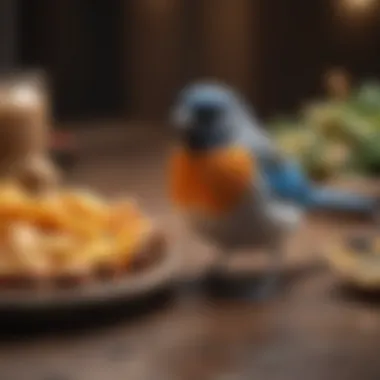
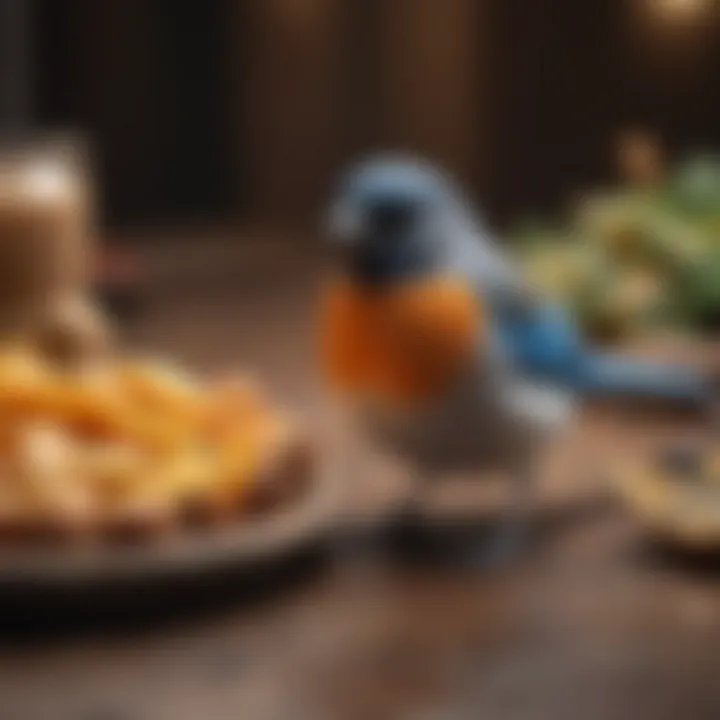
Regularly observing your bird and making note of any of these signs can lead to early detection of nutritional deficiencies.
Consulting with an Avian Veterinarian
When it comes to your feathered friend’s health, don’t hesitate to consult with an avian veterinarian. These specialized professionals can provide invaluable advice and assistance regarding your bird's nutritional needs. Here’s why consulting a vet is essential:
- Expert Guidance: An avian vet understands the nuances of bird health and nutrition better than anyone. They can help identify deficiencies through a thorough examination.
- Tailored Diet Plans: Vets can create customized feeding plans based on your bird's species, age, and health status.
- Additional Testing: Sometimes, specific blood tests or other diagnostic tools are needed to assess your bird's health and nutritional standing accurately.
- Prevention: Regular check-ups with your vet can lead to preventive care, catching any potential issues before they escalate.
Ultimately, the health of your pet bird depends heavily on the attention given to their diet and nutritional needs. By recognizing signs of deficiencies and actively engaging with your veterinarian, you are well on your way to nurturing a thriving, happy feathered companion.
"An ounce of prevention is worth a pound of cure." Taking proactive steps in recognizing nutritional deficiencies will undoubtedly yeild benefits in the long run.
Practical Feeding Strategies
In the world of pet bird care, practical feeding strategies make all the difference in ensuring their health and happiness. Understanding how to nurture our feathered companions goes beyond just filling a bowl with seeds. These strategies encompass a holistic approach, addressing not only what birds eat but how they eat. Providing a well-structured feeding routine can prevent nutritional deficiencies and behavioral problems, laying the groundwork for a fulfilling life for the bird. Factors like timing, food variety, and appropriate tools can significantly impact an avian’s well-being.
Creating a Feeding Schedule
Consistency is key when it comes to feeding pet birds. Establishing a feeding schedule helps to set a rhythm that birds can adapt to, which can reduce stress and promote healthy eating patterns. Ideally, a routine should include multiple small meals throughout the day instead of one or two larger servings. This aligns with their natural behaviors, as many birds are foragers.
- Morning and Evening Feedings: Offering food in the morning and again in the early evening can mimic the feeding habits they would experience in the wild.
- Regular Check-ins: Set times to evaluate food availability and freshness. Remove any uneaten food to avoid spoilage. This promotes a clean feeding environment and encourages the bird to eat fresh items offered.
Naturally, individual species may have slight differences in their feeding needs, so it's wise to adjust this schedule based on observation. If a bird consistently leaves certain items untouched, reconsider their overall preferences and adjust accordingly.
Encouraging Variety in the Diet
Variety is not just the spice of life; it’s essential for a balanced avian diet. Different birds have different taste preferences, and a varied diet can provide all the necessary nutrients absent from repetitive menus.
- Incorporate Fresh Foods: Strive to introduce new vegetables and fruits weekly. Be it leafy greens, colorful peppers, or even fruits like apples or berries, each offers unique vitamins and minerals. Make sure to wash them well and chop them into bite-sized pieces!
- Rotate Different Seeds and Pellets: Don’t stick to just one seed type. Mixing various seeds and looking into high-quality pelleted diets can ensure a broader range of nutrients.
- Observe Reaction: Not every bird will take to every food. Desktop trial and error can be an ideal way to determine preferences. Pay attention to which foods your bird enjoys the most, and incorporate them into the routine.
Engaging birds with new tastes not only nurtures their bodies but also their minds. This can prevent boredom and behavioral issues like feather plucking or screaming, which can sometimes stem from lack of stimulation.
Feeding Tools and Equipment
When crafting a tailored feeding experience, the tools and equipment you use can play a vital role. The right gear helps facilitate ease of feeding while ensuring that the food stays fresh and appealing.
- High-Quality Bowls: Invest in sturdy, easy-to-clean bowls made from materials that do not harbor bacteria. Stainless steel dishes are often a favorite among bird owners for their durability and hygiene.
- Foraging Toys: There are many toys designed to hold food in a way that mimics the natural behavior of foraging. This not only keeps the food interesting but also encourages healthy mental engagement.
- Measure Portions: Consider using measuring scoops for seed and pellets to ensure that portion sizes remain consistent. This can assist in managing their weight and keeping an eye on their health.
By establishing effective feeding strategies, pet bird owners can make a profound difference in the overall health and wellness of their avian friends. Remember, a balanced, varied diet served at regular intervals is crucial for maintaining optimal avian health.
Long-Term Nutritional Maintenance
The journey toward optimal nutritional health for pet birds doesn’t stop once you've settled on a diet. Long-term nutritional maintenance ensures your feathered friend thrives over time, adapting their diet to various life stages and health changes. Consistent attention to their nutritional habits can not only enhance their quality of life but also extend their lifespan. Understanding and implementing these strategies is the cornerstone of responsible pet ownership.
Assessing Dietary Changes Over Time
To ensure that your bird receives the best nutrition possible, it’s crucial to regularly assess their dietary changes. Just like humans, birds can undergo shifts in appetite and preferences due to age, health conditions, or even seasonal changes.
- Start by keeping a detailed diary of what your bird eats—tracking the types of food, their quantity, and how frequently you introduce new items. Quite frankly, it’s like keeping tabs on their culinary journey.
- Observe if your bird shows any particular likes or dislikes. If your budgie seems to turn its beak up at a certain brand of pellets, it may be time to try a different option.
- Be aware of signs indicating a potential imbalance in their diet. Unusual behaviors, such as lethargy or feather plucking, can sometimes hint at deficiencies in their meals.
Consider these major factors when assessing dietary changes:
- Age: A young bird might require a different nutrient ratio than a senior one.
- Health Issues: If your bird has recently been ill, dietary adjustments may be necessary to meet its specific health needs.
- Seasonal Preferences: Birds sometimes crave different foods during certain times of the year. For example, a cockatiel might enjoy more fruits in the warmer months.
"Nutritional balance isn’t a static target; it’s an ongoing adjustment based on your bird’s unique behavior and needs."
Monitoring Weight and Health
Weight and health monitoring should be done consistently to ensure that your pet bird remains in tip-top shape. No one likes to deal with sudden surprises, especially when it comes to our feathery companions. Keeping a watchful eye can prevent minor issues from spiraling into larger health concerns.
Here are some steps to keep in mind:
- Regular Weigh-Ins: Make it a routine to weigh your bird weekly or bi-weekly. Any significant changes can signal dietary needs or health issues. A little change can mean a lot.
- Visual Health Checks: Besides weighing, observe your bird physically. Look for fluffiness, feather condition, and any unusual swelling. A visibly healthy bird often reflects a well-balanced diet.
- Behavioral Observations: Note any changes in energy levels or activity. A previously playful parakeet that suddenly becomes lazy might indicate nutritional deficiencies or other health concerns.
Implementing these strategies allows you to adjust their diet appropriately and ensure that they stay happy and vibrant for years to come. With the right attention, you can create a nourishing environment that supports the long-term health of your bird.
Ending
In wrapping up our exploration of avian nutrition, it's evident that providing the right diet for pet birds is not just vital but also a rewarding endeavor. A well-thought-out approach to feeding these feathered companions ensures their health and happiness. As we've discussed, bird diets are multifaceted, and understanding the nuances can significantly impact their well-being.
Summarizing Key Points
To forge a clear path, let’s recap the essential points we’ve highlighted:
- Balanced Diet Significance: A diversified diet includes seeds, pellets, and fresh fruits and vegetables. Each component carries its unique nutritional value.
- Species-Specific Needs: Different species of birds require tailored diets, with small, medium, and larger parrots all having diverse needs due to their metabolism and dietary habits.
- Common Misconceptions: Many pet owners mistakenly believe that seeds alone provide all necessary nutrition. This misconception can lead to serious health complications.
- Supplementation Awareness: Knowing when and how to supplement can elevate the nutrition of a bird’s diet, especially for calcium and probiotics that can support overall health.
- Long-Term Monitoring: Regular assessment of dietary choices helps in adjusting the foods based on a bird’s changing health or preferences, ensuring longevity and vitality.
Emphasizing the Importance of Ongoing Education
Bird ownership comes with a responsibility to continually educate oneself about best practices in avian care, particularly regarding nutrition. The world of bird feed is constantly evolving, with new discoveries in dietary science and product innovations emerging regularly. Regular visits to avian veterinarians, reading up on recent scientific literature, or even community discussions on platforms like Reddit can provide fresh insights and practical advice.
Furthermore, connecting with fellow bird owners through forums or platforms such as Facebook can foster a supportive community where experiences and knowledge are shared. This ongoing learning journey helps in ensuring that pet birds lead healthy, enriching lives and also strengthens the bond between the owner and their feathered friend.















